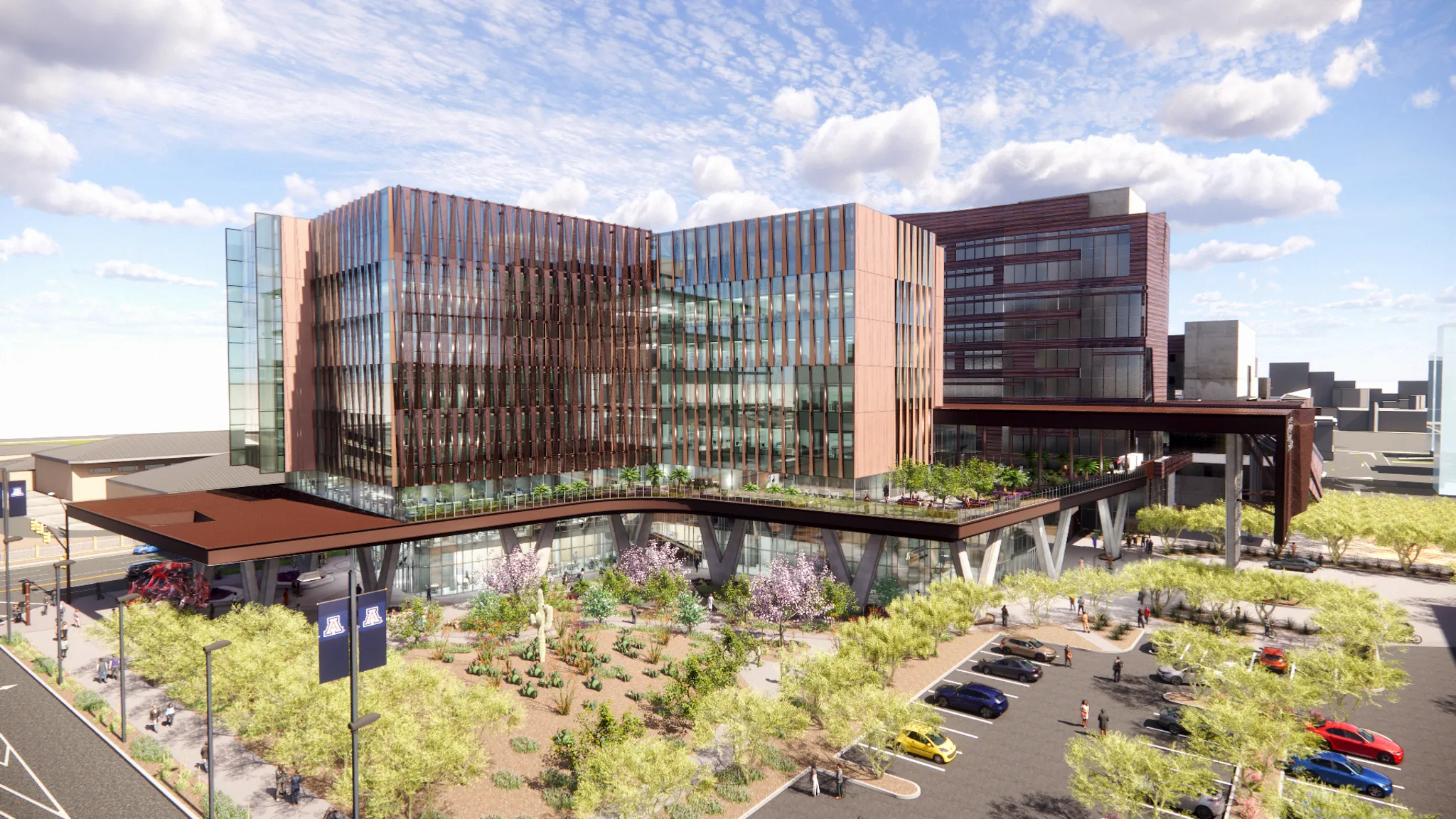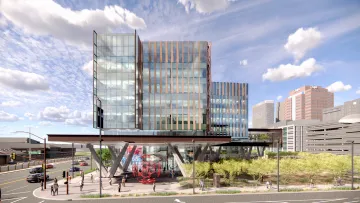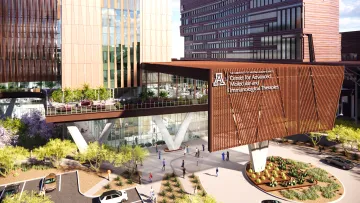CAMI Set to Transform Immunotherapy Field

CAMI Rendering Courtesy of McCarthy + SmithGroup (rendering for illustrative purposes only)
The Center for Advanced Molecular and Immunological Therapies will support research to catalyze the next generation of precision health care treatments.
Researchers and physician-scientists are increasingly using precision medicine to develop new cell- and gene-based therapeutic options for diseases, building on the idea that the most effective defense against health issues is the body’s natural immune system.
CAMI is being developed to advance knowledge of the immunology of cancers, infectious dis-eases and autoimmune conditions to develop novel strategies for the diagnosis, prevention and treatment of diseases.
Deepta Bhattacharya, a professor at the University of Arizona College of Medicine – Tucson’s Department of Immunobiology, is the inaugural executive director of CAMI. He played an integral role in the development of CAMI after serving on the CAMI Advisory Council, a group of leaders of science, government and private industry from across Arizona. He began in this role July 1.

“There is not a field with more explosive growth than immunotherapy. There is rapid growth in research investment and increased formation of academic and industry partnerships around the world,” says Michael D. Dake, senior vice president for University of Arizona Health Sciences. “My hopes are that CAMI is going to provide opportunities to accelerate the development and delivery of revolutionary treatments for the management of cancer, autoimmune and infectious diseases.”
Changing the way doctors treat disease
Immunotherapy is one of the most promising approaches to cancer treatment, as it has the potential to sidestep the effects of therapies that can compromise patients’ long-term health and wellness. But cancer isn’t the only target researchers, including bioengineer Michael Kuhns, have in their sights.
“Bioengineers solve fundamental problems with technologies that can have many applications,” says Kuhns, a professor at the College of Medicine – Tucson and a member of the BIO5 Institute. “If you can make something run more efficiently in certain circumstances — for example, make T cells in the immune system more effective at combating a particular disease — then the only limit to immunotherapy is your imagination.”
Kuhns’ research focuses on engineering chimeric antigen receptors, or CARs, a relatively new type of gene therapy. He built a biomimetic five-module chimeric antigen receptor, or 5MCAR, to direct killer T cells to target and destroy autoimmune T cells. When tested in a diabetic mouse model, the 5MCAR T cells recognized and destroyed pathogenic T cells, effectively preventing Type 1 diabetes.

“This technology has clear implications for autoimmune disease, but also for cancer,” says Kuhns, who serves on the 21-member CAMI Advisory Council. “This technology emerged from basic science, is taking hold in the laboratory and is showing promise to go to the clinic. This is a prime example of what we can do.”
CAMI will build on U of A Health Sciences’ expertise in basic science, translational medicine and investigator-initiated clinical trials to advance immunotherapy research in four areas: cancer, infectious diseases, autoimmune diseases and real-time immune system monitoring.
The scope of work CAMI will do has already drawn the support of state and Maricopa County leaders, as well as private donors.
- The Phoenix City Council approved approximately $20 million in funding for CAMI.
- Former Arizona Gov. Doug Ducey designated $150 million for CAMI.
- A $3 million gift from Bruce and Patricia Bartlett created the George A. Vanderheiden Endowed Chair in Cancer Immunological Research at CAMI.
- The Steele Foundation’s $10 million gift to the University of Arizona to create the Daniel Cracchiolo Institute for Pediatric Autoimmune Disease Research at the Steele Children’s Re-search Center includes $2 million in support of CAMI.
- The Maricopa County Board of Supervisors designated $4 million in American Res-cue Plan Act funds to support CAMI and the research that will be done to prevent and treat diseases such as long COVID.
Developed in partnership between the SmithGroup design firm and McCarthy construction company, the 200,000-square-foot CAMI building will help solidify the Phoenix Bioscience Core as a leading center for cell and gene therapy research, startup activity and corporate engagement. It will also serve to anchor the district as a hub for partnering institutions throughout Arizona, including Arizona State University, Northern Arizona University, the Mayo Clinic and the Translational Genomics Research Institute, among others.
